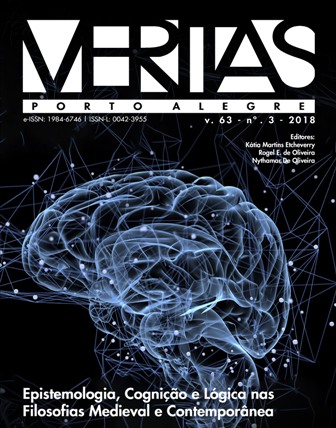The foundation of knowledge in L’être et le néant
DOI:
https://doi.org/10.15448/1984-6746.2018.3.31777Keywords:
Knowledge, Phenomenological Ontology, Negation, Consciousness.Abstract
We intend to analyze in this article the ontophenomenological basis of knowledge in L’être et le néant (1943). As we will see, the knowledge will be defined from an internal negation defined as the fundamental ontological relation between being-for-itself and being-in-itself. However, if we want to understand this relationship, we will have to scrutinize Sartre's definitions of being of the phenomenon and the phenomenon of being, transphenomenal being, being-in-itself, being-for-itself, and reflexive-reflective structure of the cogito. Recovering this definitions, we will show that the identity of being-for-itself and knowledge, before signaling that knowledge is the measure of being, emerges from an ontophenomenological record in which the for-itself, while nothingness, announces itself from the in-itself.Downloads
References
CABESTAN, Philippe. L’être et la conscience: Recherches sur la psychologie et l’ontophénoménologie sartriennes. Paris: Éditions OUSIA, 2004.
DE COOREBYTER, Vincent. Sartre face à la phénoménologie: Autour de “L’intentionnalité” et “La transcendance de L’ego”. Paris: Éditions OUSIA, 2000.
_______. “Les paradoxes du désir dans L’être et le néant”; in: Sartre. Désir et liberté. Paris: PUF, 2005, pp. 85-112.
_______. “L’être et le néant ou le roman de la matière”; in: Les Temps Modernes: lecteurs de Sartre, n° 667. Paris: Éditions Gallimard, 2012, pp. 1-11. DOI: https://doi.org/10.3917/ltm.667.0001
MOUILLE, Jean-Marc. Sartre: Conscience, ego et psyche. Paris: PUF, 2000. DOI: https://doi.org/10.3917/puf.mouil.2000.01
MOUTINHO, Luiz Damon Santos. “O dualismo fundamental da fenomenologia sartriana”; in: Questões de Filosofia Contemporânea. São Paulo: Discurso Editorial, 2006, pp. 89-95.
NARBOUX, Jean-Philippe. “Intentionnalité et négation dans L’être et le néant; in: Sartre. L’être et le néant. Nouvelles lectures. Textes réunis par Jean-Marc Mouille et Jean-Philippe Narboux. Paris: Les Belles Lettres, 2015, pp. 57-92. DOI: https://doi.org/10.14375/NP.9782251445359
RODRIGUES, Malcom Guimarães. Consciência e má-fé no jovem Sartre. A trajetória dos conceitos. São Paulo: ed. UNESP, 2010.
SARTRE, Jean-Paul. La transcendance de l’ego et autres textes phénoménologiques. Texte introduits et annotés par V. de Coorebyter, Paris: J. Vrin, 2003.
_______. L’être et le néant – Essai d’ontologie phénoménologique. Paris: Éditions Gallimard, “Tel”, 2010a.
_______. “Carnets de la drôle de Guerre”; in: Les mots et autres écrits autobiographiques. Paris: Gallimard, “Bibliothèque de la Pléiade”, 2010b.
_______. Qu’est-ce que la littérature?. Paris: Éditions Gallimard, “Idées”, 1980.
SOUZA, Thana Mara de. Tensão e ambiguidade na filosofia de Jean-Paul Sartre”; in: Revista Trans/Form/Ação, v. 35, n.1. Marília: UNESP, 2012, pp. 147-166. DOI: https://doi.org/10.1590/S0101-31732012000100010
Downloads
Published
How to Cite
Issue
Section
License
Copyright
The submission of originals to Revista Veritas implies the transfer by the authors of the right for publication. Authors retain copyright and grant the journal right of first publication. If the authors wish to include the same data into another publication, they must cite Revista Veritas as the site of original publication.
Creative Commons License
Except where otherwise specified, material published in this journal is licensed under a Creative Commons Attribution 4.0 International license, which allows unrestricted use, distribution and reproduction in any medium, provided the original publication is correctly cited. Copyright: © 2006-2020 EDIPUCRS</p






